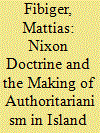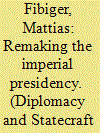|
|
|
Sort Order |
|
|
|
Items / Page
|
|
|
|
|
|
|
| Srl | Item |
| 1 |
ID:
177987


|
|
|
|
|
| Summary/Abstract |
This article reinterprets the Indonesian invasion of East Timor as a ‘diplomatic counter-revolution’. Using the central archival records of the Suharto regime for the first time in English-language scholarship, it unearths a diplomatic campaign undertaken by agents of the New Order to secure international support for an Indonesian invasion of East Timor. This diplomatic offensive spanned Southeast Asia, non-aligned and Afro-Asian networks, Western capitals, international institutions and media circuits, and global capital markets. Its success tipped the balance of power in Jakarta away from advocates of restraint like Adam Malik and towards advocates of annexation like Ali Murtopo. The diplomacy behind Indonesia's invasion of East Timor reveals that the architecture of globalization, lauded by some scholars as inherently liberatory, was in fact agnostic, capable of being turned to counter-revolutionary purposes in addition to revolutionary ones. And it suggests that diplomacy itself had been counter-revolutionized, as geopolitical and geoeconomic change combined to make the international system, particularly the states of the Global South, far more hostile to state-making claims and transformative world-making projects.
|
|
|
|
|
|
|
|
|
|
|
|
|
|
|
|
| 2 |
ID:
183950


|
|
|
|
|
| Summary/Abstract |
President Richard Nixon arrived on the Pacific island of Guam in the late afternoon of July 25, 1969. Only hours after witnessing the splashdown of the Apollo XI spacecraft, Nixon spoke to reporters and articulated what came to be known as the Nixon Doctrine. The president focused his remarks on the need for a post-Vietnam War framework for American involvement in Asia. He argued that geography and history had fashioned of the United States a Pacific power, one whose interests and responsibilities stretched far beyond its western shores. And a Pacific power it would remain. Only the United States, Nixon insisted, could deter aggression by communist states like China, North Korea, and North Vietnam. But the president went on to explain that changes on both sides of the Pacific demanded a new American strategy. In the United States, the “frustration” wrought by the Vietnam War imposed limits on Americans’ willingness to bear the burdens of the defense of freedom abroad. Meanwhile across the Pacific, nationalist consolidation and economic development had rendered Asia far more secure, and the region’s people “no longer want to be dictated to from the outside.”1 These new circumstances, Nixon concluded, demanded a new policy: the United States would continue to furnish its Asian allies with the military and economic aid—but no longer the manpower—necessary to subdue threats that arose within their national borders.
|
|
|
|
|
|
|
|
|
|
|
|
|
|
|
|
| 3 |
ID:
170991


|
|
|
|
|
| Summary/Abstract |
The 1975 Mayaguez incident was a missed opportunity to establish a more democratic American foreign policy. President Gerald Ford managed the crisis seeking domestic and international credibility. But his conception of credibility was more fractured than that of his predecessors, who regarded it as synonymous with militarism, presidential primacy, and secrecy. Ford believed the preservation of American power depended upon a renewal of American democracy, and he was determined to preside over a period of national reconciliation after the traumas of Watergate and Vietnam. His sense of credibility therefore pushed him towards diplomacy in addition to militarism, co-operation with Congress in addition to presidential unilateralism, and openness in addition to secrecy. The antinomies within Ford’s sense of credibility were partly a product of his time, which saw an eruption of public scepticism towards American and presidential power, and partly of his temperament and experience endowing him with a reverence for democratic consensus. Throughout the crisis, Ford wrestled with the contradictions embedded within his sense of credibility. Although he ultimately resolved those contradictions in an anti-democratic direction and deepened the imperial presidency, that outcome was not foreordained.
|
|
|
|
|
|
|
|
|
|
|
|
|
|
|
|
|
|
|
|
|